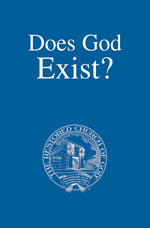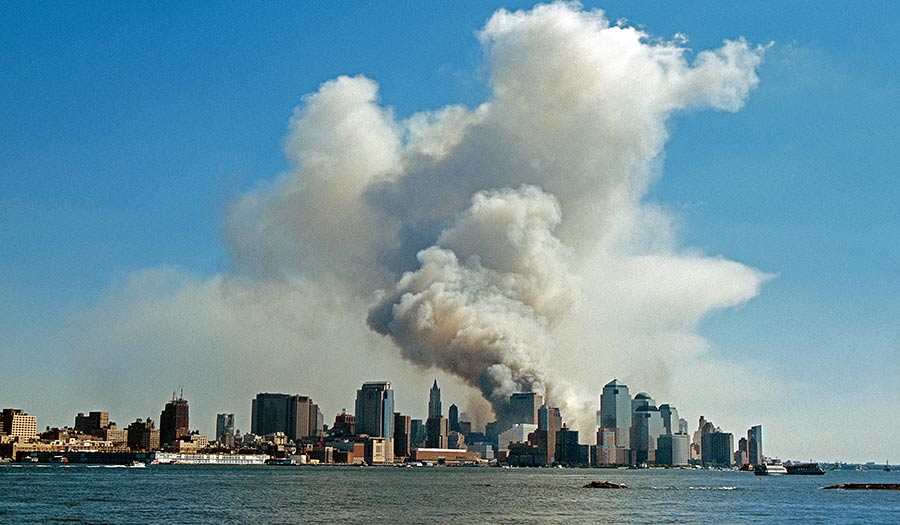 Hulton Archive
Hulton Archive
Article
More than 20 years have passed since the worst terrorist attack on American soil. There is one crucial lesson we must never forget from that day.
 Hulton Archive
As seen from New Jersey, smoke hangs over lower Manhattan after the collapse of the twin towers of the World Trade Center in a terrorist attack in New York City (Sept. 11, 2001).
Hulton Archive
As seen from New Jersey, smoke hangs over lower Manhattan after the collapse of the twin towers of the World Trade Center in a terrorist attack in New York City (Sept. 11, 2001).
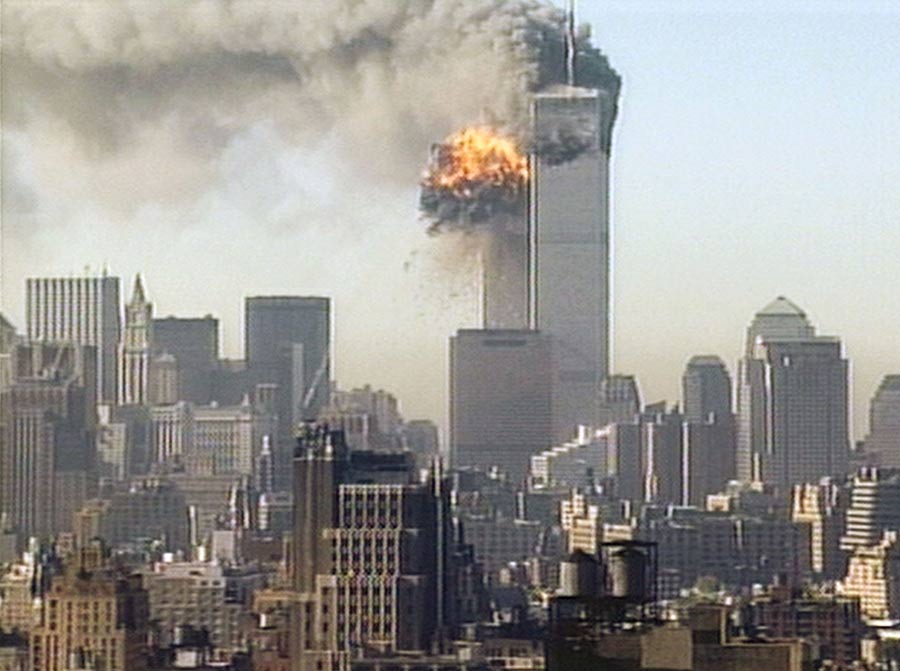 CNN
Hijacked United Airlines Flight 175 is flown into the south tower of the World Trade Center (Sept. 11, 2001).
CNN
Hijacked United Airlines Flight 175 is flown into the south tower of the World Trade Center (Sept. 11, 2001).
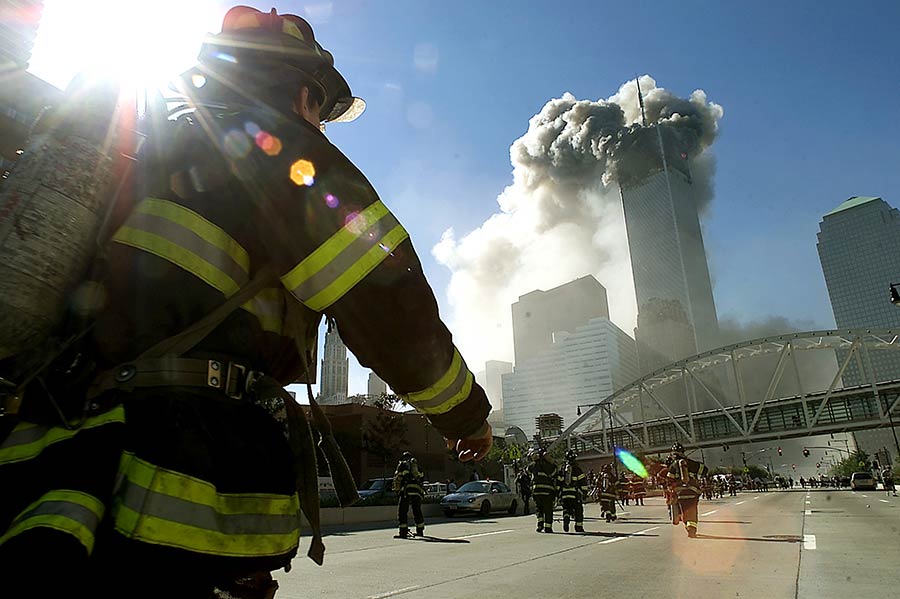 Jose Jimenez/Primera Hora/Getty Images
Firefighters walk toward one of the towers at the World Trade Center before it collapsed.
Jose Jimenez/Primera Hora/Getty Images
Firefighters walk toward one of the towers at the World Trade Center before it collapsed.
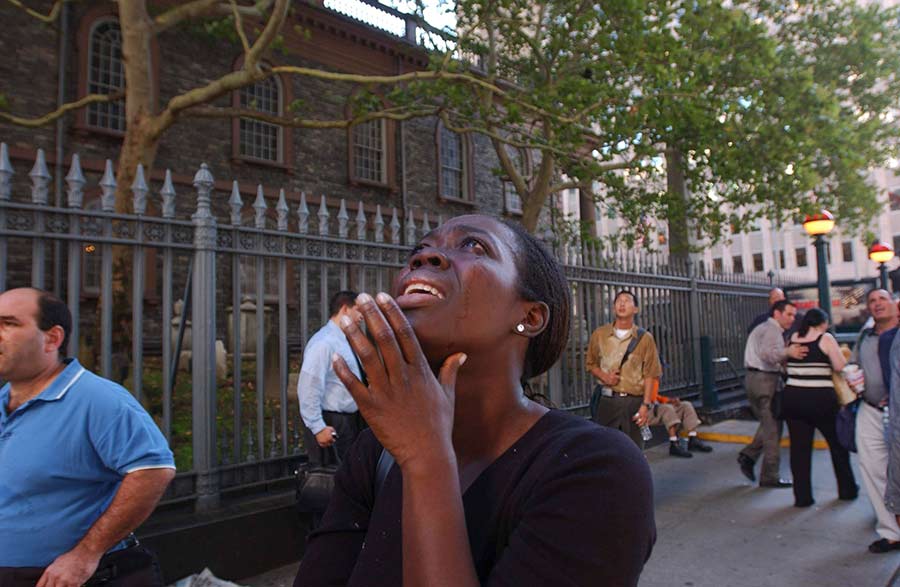 Spencer Platt/Getty Images
A woman reacts as she looks up to the burning towers.
Spencer Platt/Getty Images
A woman reacts as she looks up to the burning towers.
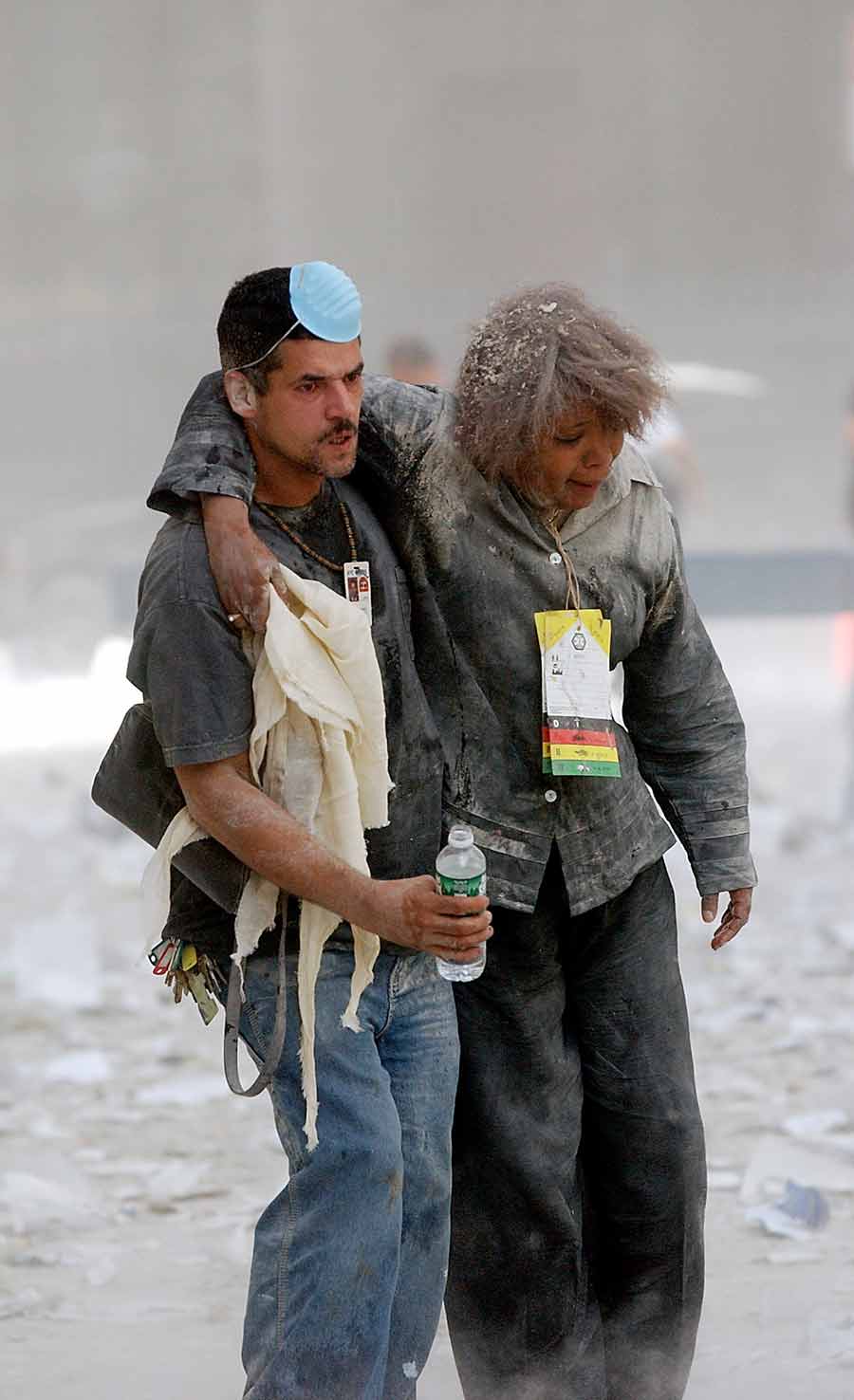 Stan Honda/AFP via Getty Images
A man helps evacuate a woman through rubble and debris after the collapse of one of the World Trade Center towers.
Stan Honda/AFP via Getty Images
A man helps evacuate a woman through rubble and debris after the collapse of one of the World Trade Center towers.
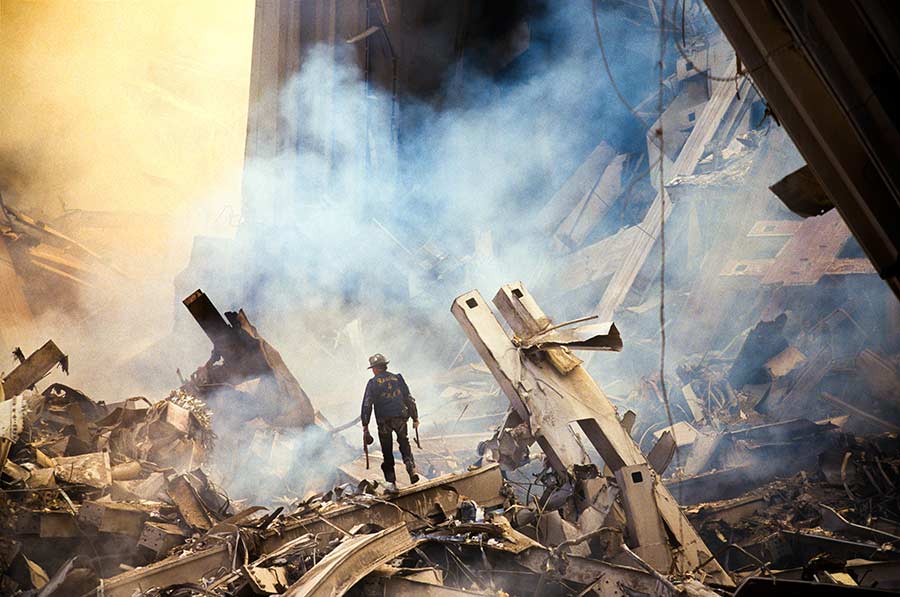 Porter Gifford/Corbis via Getty Images
The rubble of the towers smolders after their collapse (Sept. 11, 2001).
Porter Gifford/Corbis via Getty Images
The rubble of the towers smolders after their collapse (Sept. 11, 2001).
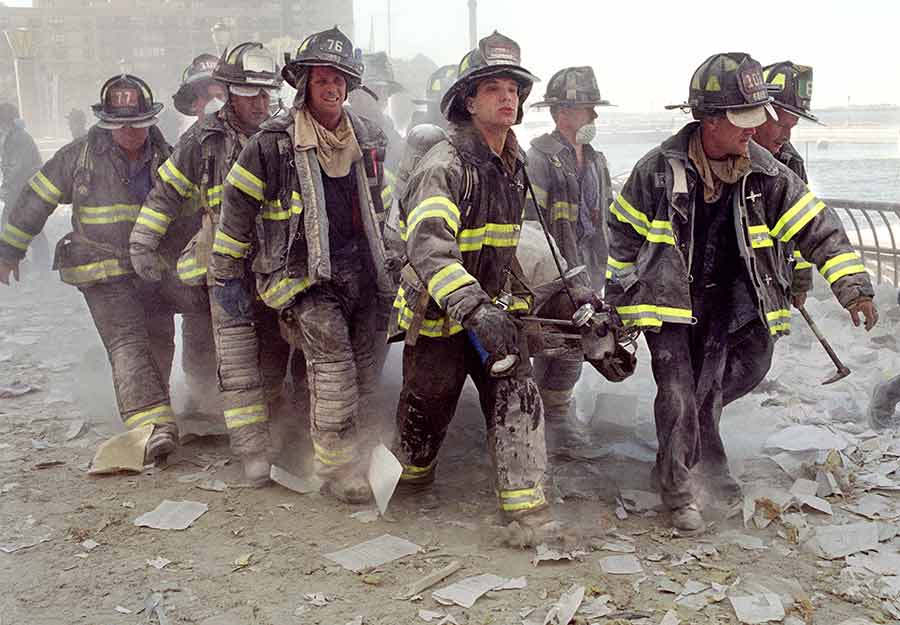 Matt Moyer/Corbis via Getty Images
New York firefighters carry a team member who was injured in the collapse of the towers.
Matt Moyer/Corbis via Getty Images
New York firefighters carry a team member who was injured in the collapse of the towers.
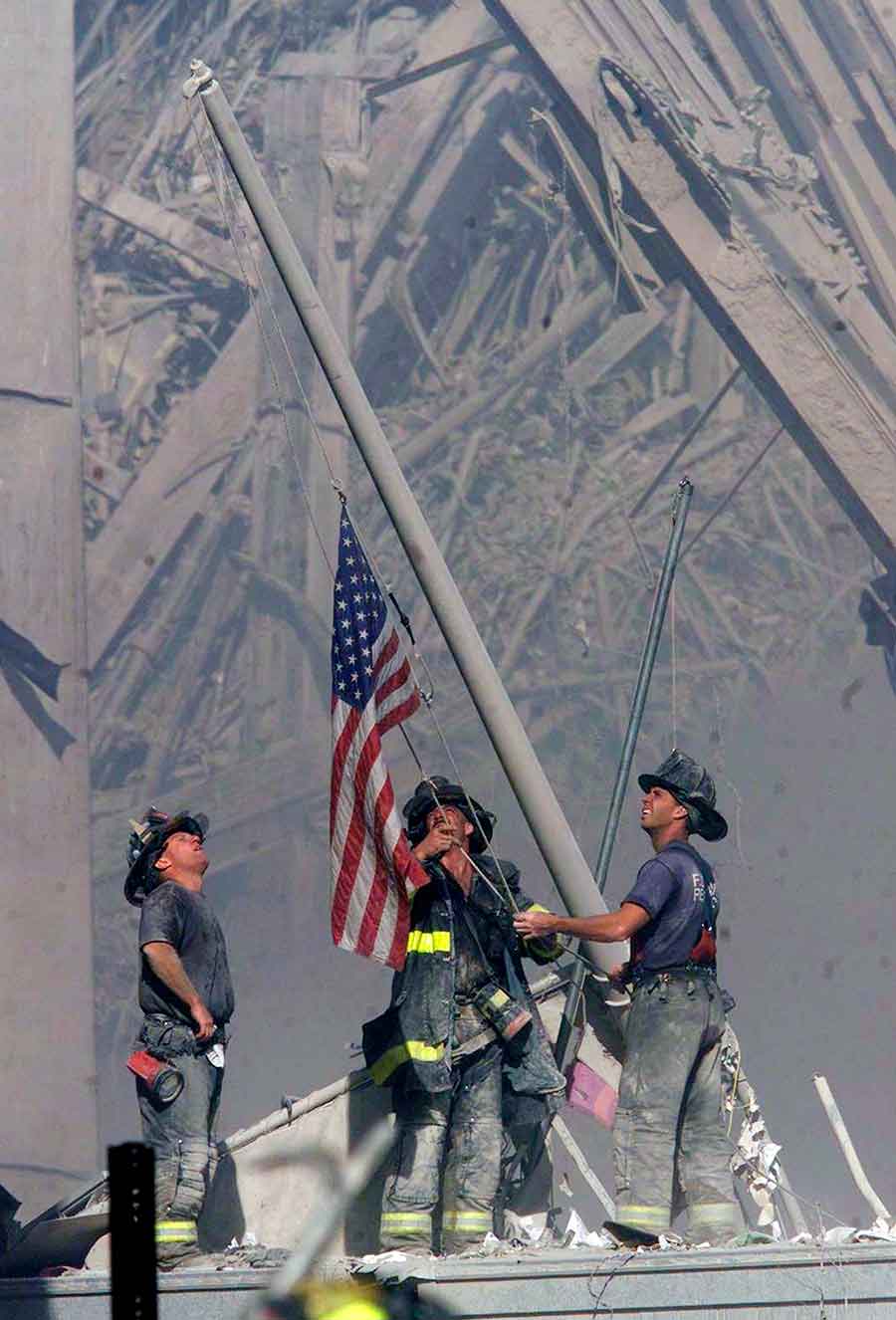 Thomas E. Franklin/Bergen County, NJ, Record via Getty Images
Firefighters raise an American flag at ground zero in New York City.
Thomas E. Franklin/Bergen County, NJ, Record via Getty Images
Firefighters raise an American flag at ground zero in New York City.
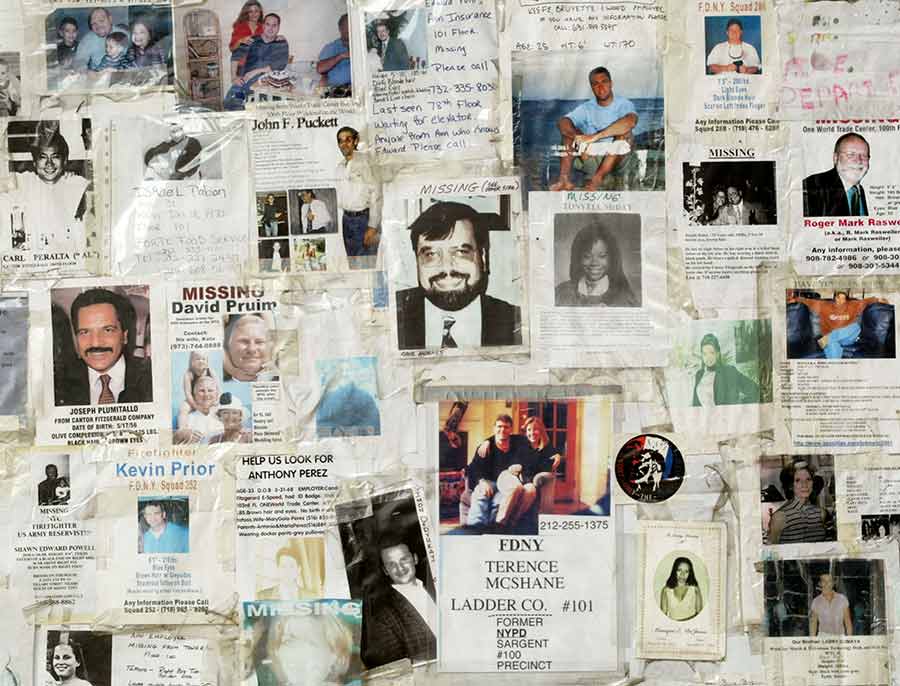 Mario Tama/Getty Images
A poster shows people missing since the attacks (Aug. 22, 2002).
Mario Tama/Getty Images
A poster shows people missing since the attacks (Aug. 22, 2002).
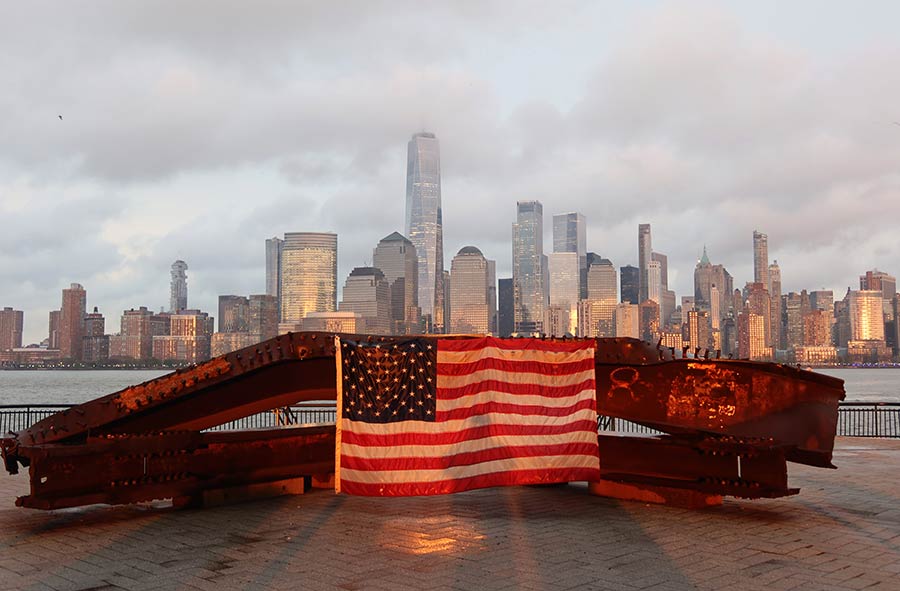 Gary Hershorn/Getty Images
The sun sets on a 9/11 memorial in front of the lower Manhattan skyline (April 21, 2021).
Gary Hershorn/Getty Images
The sun sets on a 9/11 memorial in front of the lower Manhattan skyline (April 21, 2021).
Somehow, it has been 20 years. Two decades since terrorists hijacked planes and crashed them into U.S. symbols of military power and commerce. Yet those events are seared into the consciousness of everyone who lived through them…
Of course, September 11, 2001, began like any other day. I remember being at work for a health insurance company in Nebraska. A colleague came in and demanded I come with him. I refused just as firmly. Since I traveled so much for work at the time, it was unusual to have time at my desk. I was relishing the rare office productivity.
Finally, he grabbed me by the arm, dragged me from my desk and placed me in front of a TV in the cafeteria. Watching the World Trade Center towers burn during a live broadcast was surreal. Watching them crumble into piles of metal, glass and dust was equally unreal—like watching a movie. There was now a gaping hole in the New York City skyline.
Yet, for me, the event was also deeply personal. Through work, I knew people who were in the towers that day. Some were friends. Some were good friends. I knew their families from dinners we had eaten together, sometimes in their homes. True friends.
All told, 2,977 people were killed that day (not including the terrorists): 2,753 people died in the attacks in New York City including 343 firefighters, 37 Port Authority officers, 23 police officers, and all the passengers and crew on the airplanes; 184 died in the Pentagon attack; and 40 died in the thwarted attack when a plane crashed in Pennsylvania. Many more have continued to suffer from the residual physical and mental wounds. Families of the victims who died that day still suffer.
A surviving friend related a gut-wrenching story. Someone both he and I knew, after descending just a couple of flights of stairs, said he needed to return to his desk. A manual switch had been recently installed under the man’s desk that would back up the entire data off site that was stored locally in the tower. In the panic of the moment, he forgot to flip the switch. It would cost the company dearly if the switch was not activated.
My good friend said the colleague was told by many not to go back. But the man quickly determined it would only take a few minutes at most. So, he turned and ran back up the stairs—going against the flow of humanity fleeing the already burning tower. We know the man made it to his desk and flipped the switch because the data was fully backed up to a remote site. But we never saw him again. A family suffered the loss of a husband and father.
I remember seeing the anguish and tears on my friend’s face as he described his devastation. I cried with him. Although I tried, no amount of consoling in any manner could ever relieve him of the anguish he felt. I listened to my friend quietly. All I could do was just be there.
We all have stories from 9/11. Some of us are firefighters who experienced the most harrowing day on the job. Some of us are the children of “jumpers,” those who propelled themselves from broken windows or walls in the towers to avoid a fiery death—or perhaps hoping they would somehow survive the fall. Some of us remember the smell of burnt plastic that lingered in the air of New York City for weeks after the attacks.
All of us were changed by that day, and there were many things learned during and after 9/11. Revisiting those horrible events 20 years later brings back into focus the most important lessons of all.
Individual Impact
As I watched the towers go down on my work cafeteria’s TV, I was already overwhelmed with an intense heartache for the people I knew. They were in those buildings, scrambling for their lives. I felt an intense pain for their wives, husbands and children who would never see them again. I watched it live for some time in disbelief. The commentators were also just as disbelieving.
I cannot recall exactly when, but I realized I needed to go home. This was a national emergency and my house was only a few miles from the U.S. Strategic Command at Offutt Air Force Base. All branches of the military reported through this base. At that moment, StratCom was one of the most important military command bases in the world.
I was more grateful than I ever had been to be able to go home. To my wife. To my children if they were home from school. I realized that, after today, many would never see their loved ones again.
So I just left. I mentioned to one colleague that I was leaving and walked out the door. The roads were barren. Traffic was nearly nonexistent on usually busy roads.
For the entire trip home, I fought back tears for those I knew, or maybe used to know.
At home, there was an eerie quiet. Chilling, in fact. It was a quiet that my wife and I had never experienced before. All of the air traffic had been locked down. Not a single airplane could be seen in the sky, much less heard.
Suddenly, every direction we looked there were fighter jets in the sky. Aircraft engines thunderously vibrated the air. They looked like gnats in the sky. As suddenly as they appeared, these U.S. military fighter jets knifed straight up into the atmosphere and disappeared into the scattered high clouds at breakneck speed.
That same eerie calm settled over the area once again. Chilling was now an understatement. I was now fearful. Psalm 23 came to mind. I thought of how Bible prophecy could be playing out right before our eyes. Was this the end?
Considering the events of that morning, my wife and I assumed the worst—an imminent attack focused on the nearby vital military base. We looked at each other and decided to remain outside on our deck, preferring to face a quick death directly from munitions rather than slowly dying from radiation poisoning, or some other after effect of a nuclear bomb—or even wounded and unrescued in the basement of our house.
“It was a nice life with you,” I whispered as we stood arm in arm. I had never felt so helpless. Just standing there. Waiting to die.
Just then, a large aircraft flew over us several hundred feet in the air. Growing up in the U.S. Air Force as a dependent of my dad’s career, I was able to recognize the plane: Air Force One.
The president of the United States was on board and on approach to land at the base. The plane had hurriedly fled Florida where the nation’s leader was visiting with school children to an “undisclosed location.” Seeing that Boeing 747-200B abated our concerns about an impending broader attack. The president would only land in a safe place.
I recount this story with tears in my eyes. My wife has tears as well. We still have heartbreak for those we knew who became surviving family members and those who suffered in that fateful attack. It permanently changed us.
After September 11, friends and family became more important to us. Trust could be automatic with those known most intimately. New friends somehow became more difficult to develop. Trust took longer to form in new relationships. Consequently, new relationships were developed less frequent.
Jobs that required absence from home were shunned in favor of jobs that would allow time together with our children and our families. My wife and I both changed careers—we speculate this was probably from life changes that resulted from 9/11.
The impact of these events caused a different direction in our lives. The value of trusted closer relationships was even more evident to both of us. This meant more day-to-day service to those whom we knew better. Instead of community service in projects and programs, we quietly and more directly helped and served family, friends, and neighbors: food, clothing, meals, money, trips and even vacations were shared.
Yet I know my family is not alone with 9/11 having such a sweeping impact. Everyone who lived through September 11 was changed. In fact, the entire world would never be the same.
It Changed Words
More subtle changes occurred within our society after that fall day in 2001. New terms like “jumpers” were used while other words were redefined.
Before 9/11, “ground zero” was defined as the Earth’s surface directly above and below an exploding nuclear bomb. Since 2001, ground zero more broadly means the site of devastation, disaster or violent attack. An online definition of ground zero states, “The site of the former World Trade Center in New York City in the wake of the terrorist attacks of September 11, 2001.”
Even how we remember events changed. The numbers 9/11 now equate to the events of that day. The United Kingdom followed suit after the 7/7 terror attacks in 2005. The 2008 Mumbai terror attack is known as 26/11.
War has always been known to be armed conflict between different nations or states or different groups within a nation or state. But war became different after 9/11. No longer was it isolated to armed conflicts between nations. Instead, it became broader.
According to a legal definition, the War on Terror is “a global war most of the western nations and their allies waged against a spiderweb of non-state insurgency groups.” This was a new paradigm based upon the uncertainty of insurgent war. Manmade catastrophe became a constant possibility and an ongoing, continual threat.
This change catapulted each of us into the greatest uncertainty of our age.
Why Adversity?
Author Don DeLillo called 9/11 “the defining event of our time.” Long before, President John F. Kennedy said, “There is nothing more certain and unchanging than uncertainty and change.” This uncertainty is often seen in the face of adversity. 9/11 marked a sudden increase in uncertainty.
The event drove a specific point home. We are not in control of our lives. Life is full of uncertainty. This means that much of our adversity is not a result of our individual choices. We must then ask ourselves, if we cannot control events, what is left? The answer is simple: our response.
How we respond to events and circumstances is our choice. Hardship is universal. Ecclesiastes 7:14 instructs us what to do when it strikes: “…in the day of adversity consider.” “Consider” here means to advise self, to take heed, or to listen. We must recognize that troubling times will strike and stop and consider when they do. Ask: What do you do in the day of adversity? What will you do the next time it arrives?
There are many things to meditate on before and during adversity, even in catastrophic times. These events can change us for the better, if we allow them.
The Greatest Lesson
Back in late 2001, one characteristic was seen over and over. It is something we could use a lot more of today: compassion. Many who watched and experienced 9/11 demonstrated empathy, sympathy and concern. This was seen in eyes swollen from tears, anguished faces, clenched fists, sore throats from the dust and debris in volunteers and rescue workers, and the outpouring of support after the event.
Compassion is an undeniable human reaction when we see catastrophe—understanding, care and concern are often the result. Compassion includes the heartache we have when we hear about suffering happening to others and their resulting misfortune. Compassion includes the desire and the drive to help those hurt by this suffering.
We can choose to have compassion—just as God shows us.
God is the most compassionate Being in the universe. And His outflowing concern never ceases. As the Creator of all that exists, He sees and deeply understands all these things and more.
Notice this from the book of Lamentations: “It is of the Lord’ s mercies that we are not consumed, because His compassions fail not. They are new every morning: great is Your faithfulness” (3:22-23).
Yet how does a compassionate God allow an event like 9/11?
It helps to know that He has a master plan for mankind. It involves allowing human beings to try out their own ways to show that they do not work. That is what is occurring today.
Even so, God still yearns to help. His heart breaks to see suffering.
The example of Jesus Christ in the first century proves this point. Despite being persecuted by the religious leaders of the day, He still said this: “O Jerusalem, Jerusalem, you that kill the prophets, and stone them which are sent unto you, how often would I have gathered your children together, even as a hen gathers her chickens under her wings, and you would not!” (Matt. 23:37).
Throughout history, God has been ready to comfort and shelter people as a hen does her chicks. Yet few will accept this offer.
Later on, Jesus wept over those in Jerusalem: “If you had known, even you, at least in this your day, the things which belong unto your peace! But now they are hid from your eyes” (Luke 19:42).
Verses 43-44 speak of a still future time of trouble to befall Jerusalem—events in God’s Plan aimed at preparing world inhabitants to accept His abundant compassion.
While the world is not quite ready to turn to God, individuals can.
God cares so deeply for each one of us that He numbers the hairs on our heads (Luke 12:7). This means when something happens to us, each one of us, He is aware. His compassion does not, will not, and cannot fail.
We should strive to be the same. This starts by being grateful for our lives and our circumstances. This grateful attitude can encourage others around us.
Of course, this is not always so easy.
Compassion Fatigue
As these last 20 years have passed, the spike in compassion from 9/11 has waned. It does reemerge when there are other traumatic events, yet it does not seem to last as long. One reason for this is there has been a shift in how we experience adversity and view catastrophe.
We can tire and grow weary of the constant bombardment of information showing nearly constant devastation. Constant suffering. We can begin to lose sympathy for others. Compassion fatigue can replace compassion itself.
Compassion fatigue was originally defined in the 1980s by Charles Figley. By 1992 it was used to describe the response of those exposed to regular traumatic events: disaster relief workers, emergency workers, and healthcare workers are examples. Compassion fatigue is, “Indifference to charitable appeals on behalf of those who are suffering.” It is apathy to the point of being cold and uncaring. The definition goes on to state compassion fatigue is “experienced as a result of the frequency or number of such appeals.”
Compassion fatigue is from regularly experiencing trauma. Trauma can be personal or can be observed. Until recently, this intense trauma was experienced only by those who were present during a disaster or during trauma’s aftershock.
Now the information age gives us the opportunity to vicariously and constantly view human catastrophe. Whether from newscasts to online posts to social media, seeing others suffer is a regular event for all who are watching. It can numb us. This numbness results in a diminished ability to empathize, to feel compassion for others.
Soon it becomes just another murder in a deteriorating city, one of many mass shootings in the last year, or locusts causing yet another famine. It is not me or my family. It is not in my backyard.
We all feel worn out from the 24/7 news cycle. Being constantly connected by the internet is fatiguing. There is the potential of millions dead in India from COVID-19, the fires in the Amazon rainforest, collapsing governments in Haiti, Lebanon, Tunisia, Afghanistan…on and on it goes.
What can we do to combat becoming cold and numb?
A Solution
In 2016, one Iowa school presented a program to understand 9/11 and provided a lesson in compassion for their students. That year was the first freshman class to not have personally experienced September 11. According to The Gazette, parents and teachers decided to create an experience for these students to help them understand what happened back in 2001.
Using video, books and personal stories from teachers and parents to provide context, the horror of the moment was relived for the students. Instructors played a news program recorded live as 9/11 unfolded. The ninth graders were laughing at the commercials and the types of clothes the reporters were wearing, said Tony Stenberg, a teacher at the school. Then the program cut to the terror attack. He described an eerie feeling when the students realized what it was.
Instead of seeing 9/11 as just history, students saw it as real. “It helps you slip into someone else’s shoes,” said Sean Neilly, a Kennedy High School history teacher and social studies facilitator for the Cedar Rapids district. The students understood on a deeply personal level the impact 9/11 had on America, their community, and their families. Compassion followed.
Through this simple exercise, students came to realize the importance of this event. They discussed the impact and they understood. They learned compassion.
Just like the students, compassion is a quality we can develop by seeking to understand others. We should try to make it personal when we see human suffering. It should hurt. We should cry. We should deeply sigh in our hearts.
Yet, again, this is difficult. We need help. To understand how you should react to world events—and to ensure you do not grow numb to the hardship and horror going on around the world—you must have an anchor. That starts with proving for yourself that God exists.
Reading in the Bible that God’s “compassions fail not” is fine, perhaps even comforting. However, knowing for certain that He exists and is ready to extend help to you will completely change how you live. You will have the comfort of knowing God’s Plan for mankind—even in the midst of chaotic world events. Also, you can confidently turn to this loving Being and ask Him to help you grow in compassion yourself. To start this process, read our booklet Does God Exist?
With all of the tragedies occurring every day, it is always a “day of adversity” somewhere on this Earth. So let’s consider: Will you have compassion on those in their day of adversity?

